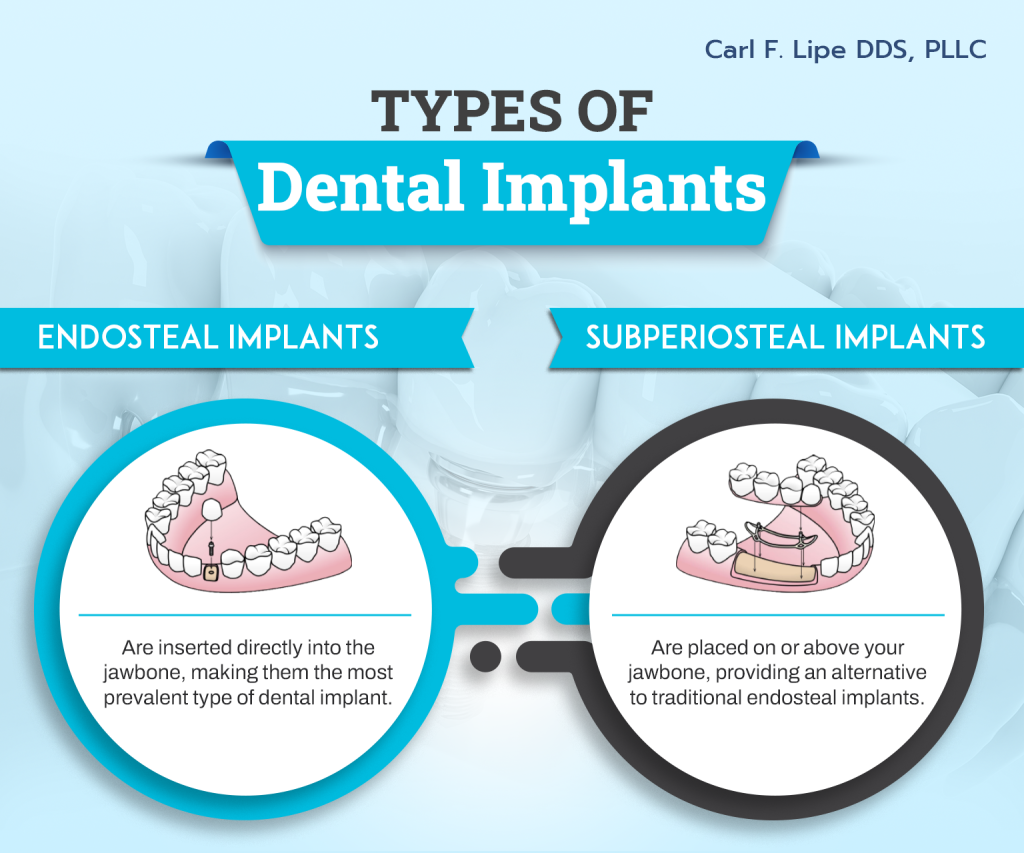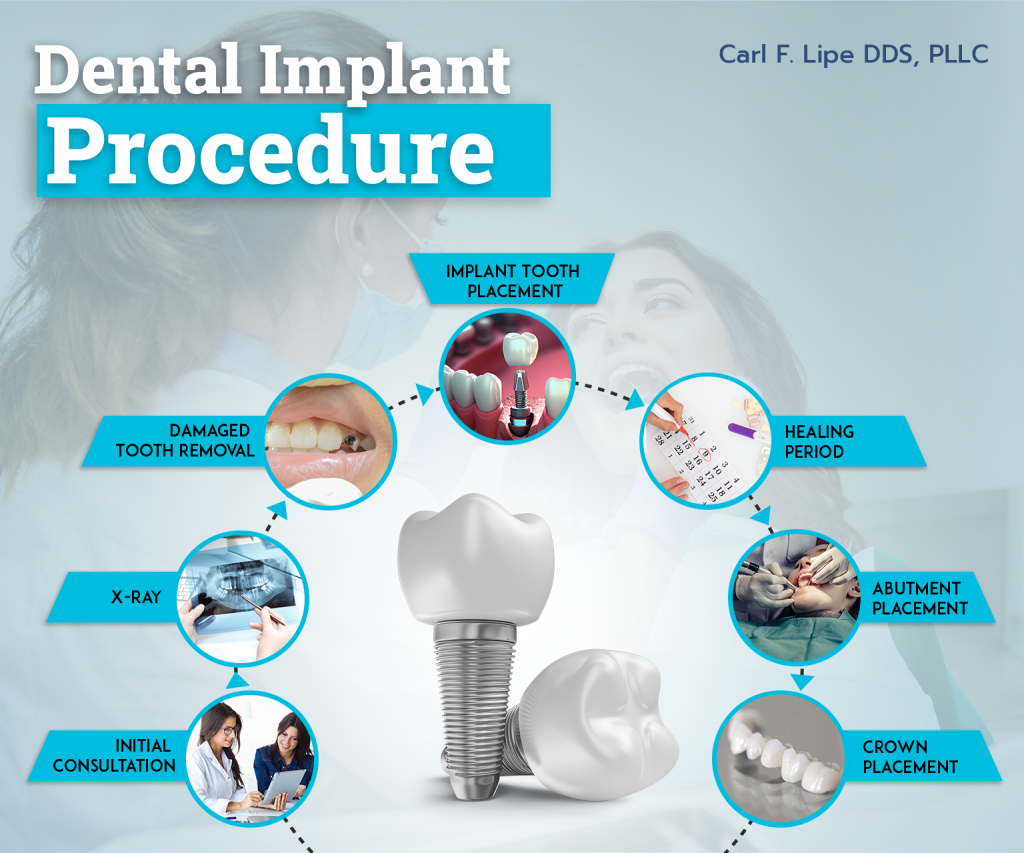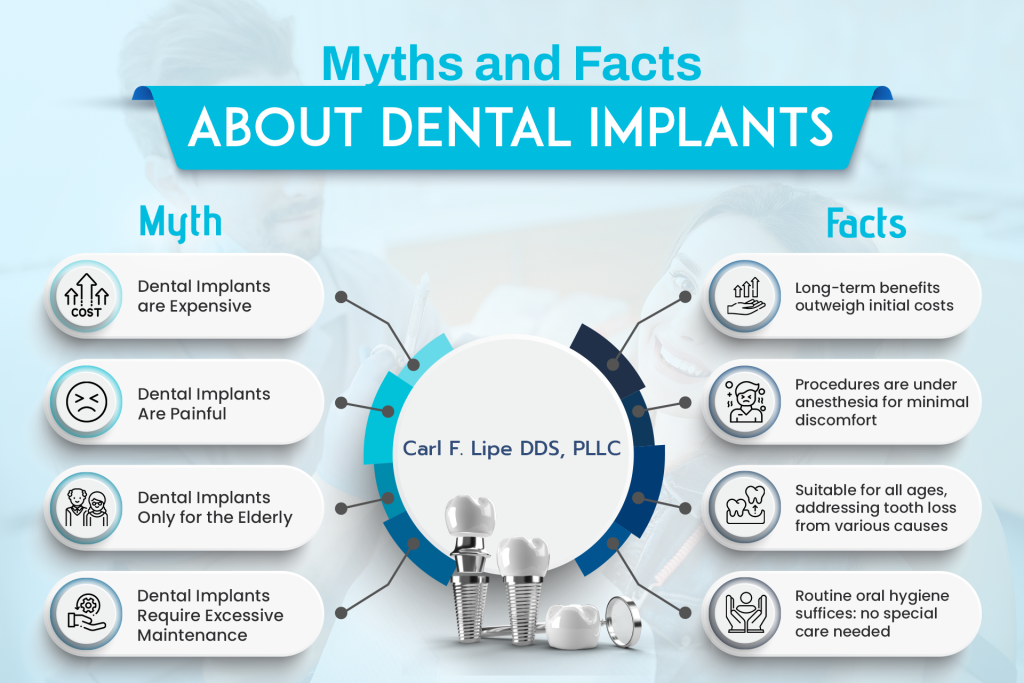Dental implants are the most effective and popular solution to replace your missing teeth. The two most common types of dental implants are endosteal and subperiosteal implants. Understanding their difference can help you choose the appropriate one.
What are Dental Implants?
Dental Implants are a permanent solution for replacing missing teeth, serving as a long-term solution for tooth loss. These implants are made from medical-grade titanium post that integrates with the jawbone and a custom crown that resembles a natural tooth. These crowns are made of ceramic or porcelain material to match your natural teeth, blending seamlessly with your smile.
Types of dental implants

Dental implants are the most effective and popular solution to replace your missing teeth. The two most common types of dental implants are endosteal and subperiosteal implants. Understanding their difference can help you choose the appropriate one.
Endosteal Implants
What are they? This is the most common type of implant that is attached to your jawbone as an artificial root for holding the replaced tooth. Typically made of titanium, these implants are surgically inserted directly into the jawbone.
When They Are Needed: Endosteal implants are great for patients with sufficient healthy jawbones to help the implant. They are frequently suggested for individuals who need an extremely durable and stable remedy for their missing teeth. By allowing the implant to osseointegrate or fuse with the bone, the process creates a sturdy base for the artificial tooth or teeth.
Subperiosteal Implants
What They Are: Subperiosteal Implants are another popular implant that is placed under the gum but above the jawbone. They are usually made of a metal frame that is fitted onto the jawbone, with posts protruding through the gums to hold the prosthetic teeth.
When They Are Needed: Unlike endosteal implants, these implants are used for patients who don’t have a healthy jawbone and cannot undergo bone augmentation procedures. They are an effective alternative for those who may not want or cannot endure the invasive process of bone grafting or other preparatory surgeries required for endosteal implants.
Selecting the right type
The choice between Endosteal vs Subperiosteal Implants depends on several factors, such as bone density and health, other health factors, and specific dental needs. A thorough examination by a dental professional will help to determine the appropriate type of implant you need. It includes imaging studies like X-rays or CT scans Dr. Carl will consider your medical history, preferences, and the specific characteristics of your jawbone before recommending the best option.
The Benefits of Dental Implants
1.Restoring Natural Function and Appearance
Dental implants stand out as the most effective solution for replacing missing teeth, closely mimicking the natural appearance of your original teeth.
2.Long-Term Oral Health Benefits
Dental implants provide long-term benefits for your oral health, as unlike traditional dentures or bridges, implants can last a lifetime.
3.Durability and Comfort
Dental implants are crafted from high-quality materials like porcelain or ceramic, which makes these last a lifetime with proper care.
4.Enhanced Quality of Life
Dental implants not only take care of your oral health but also restore the ability to chew and enjoy a range of foods, improve speech clarity, and eliminate the need for messy adhesives.
How Do Dental Implants Work?
Dental implants work by replicating the structure of natural teeth. The process begins with the surgical placement of a titanium post into the jawbone. Once the implant has integrated with the jawbone, a custom-made dental crown is attached to the post.
This crown is designed to match the color, shape, and size of your natural teeth, ensuring it blends in perfectly with your smile. They restore full chewing power, allowing you to eat, speak, and smile with confidence. With proper care and oral hygiene, dental implants can last a lifetime, making them a preferred choice for tooth replacement.
How to Prepare For Your Dental Implant Surgery?
1. Ensuring a Successful Procedure
Proper preparation is key to a successful dental implant surgery. We recommend a thorough oral hygiene routine leading up to the procedure and abstaining from smoking or alcohol consumption.
2. Pre-Surgery Instructions
Before your surgery, we’ll provide detailed instructions. This may include fasting for a certain period if sedation is to be used, arranging for someone to drive you home post-surgery, and preparing a comfortable recovery space at home.
The Dental Implant Procedure

Step 1: Initial Consultation and Planning
Your journey toward getting dental implants starts with an initial consultation with your dentist. This stage often involves dental X-rays or 3D imaging to evaluate your jawbone and customize a treatment plan to determine the optimal placement for the implant.
Step 2: Tooth Extraction
If you have a damaged or decayed that needs replacing, your dentists will remove it before the surgery. The procedure is performed under anesthesia to ensure comfort. It does not take long to remove the tooth unless it’s fractured.
Step 3: Surgical Placement of the Implant
The next step is the surgical insertion of the implant into the jawbone. This procedure is performed under local anesthesia. The titanium implant is precisely placed in the jaw, where it will eventually fuse with the bone, a process known as osseointegration.
Step 4: Healing and Osseointegration
After the implant placement, a healing period follows, during which osseointegration occurs. This critical phase, where the implant and jawbone bond together, can take several weeks to months, ensuring a stable foundation for the new tooth.
Step 5: Attaching the Abutment
Once osseointegration is complete, an abutment is attached to the implant. This component serves as a connector between the implant and the replacement tooth. Depending on your case, the gums are allowed to heal around the abutment before the final step.
Step 5: Placing the Custom Crown
The final stage involves placing the custom-made dental crown onto the abutment. This crown is crafted to match the color, shape, and size of your surrounding teeth, ensuring a natural and aesthetically pleasing result. With the crown in place, your dental implant is complete, and your smile is beautifully restored.
Aftercare and Recovery
Post-Surgery Care
Post-surgery care is crucial for the success of your dental implants. We’ll guide you through proper oral hygiene practices to prevent infection and promote healing. You may be prescribed medications to manage pain and prevent infection.
Recovery Period Expectations
During the recovery period, it’s normal to experience some swelling and discomfort. We recommend a soft diet initially and gradually returning to normal eating habits as healing progresses. Regular follow-up appointments will be scheduled to monitor your progress.

Dental Implant Cost in Denver
Understanding the Investment
The cost of dental implants varies based on individual needs and the specifics of your case. We believe in transparent pricing and will provide a detailed breakdown of costs during your consultation.
Flexible Financing Options available at our dental clinic
We understand that dental implants are a significant investment. That’s why we offer various financing options to make this crucial procedure more accessible. We’ll work with you to find a payment plan that fits your budget.
Insurance &Coverage
Navigating Insurance Benefits
Insurance coverage for dental implants can vary. Our team is experienced in working with various insurance providers and will help you understand and maximize your benefits.
Assistance with Claim Filing
We assist with insurance claim filing to ensure you receive the maximum coverage possible. Our staff is always available to answer any questions and provide support throughout the insurance process.
Why Choose Us for Your Dental Implants in Denver?
Choose Carl F. Lipe, DDS, PLLC for your dental implants because of our commitment to quality, state-of-the-art technology, and personalized dental care. Our team’s expertise ensures you receive the best possible treatment with results that speak for themselves. We also offer Dental Bridges , Cosmetic Dentistry , Denture Solution , Dental Bonding , Full Mouth Reconstruction and more.
Clinic Tour Video
Dental Implants FAQ
Can you have tooth implants with receding gums?
Yes, you can have tooth implants even with receding gums. However, successful implementation depends on the extent of the gum recession. As all of us have unique teeth and gums, a thorough evaluation by your dentist is necessary. They may recommend treatments to improve gum health before implant placement, such as gum grafting to ensure adequate support for the implant.
Can you have dental implants with severe bone loss?
Yes, individuals with severe bone loss are still eligible for dental implants. In such cases, a bone grafting process is followed to restructure the jawbone and provide a stable foundation for the dental implants. Modern techniques like sinus lifts or zygomatic implants can also be suggested based on individual patient needs.
Does Delta Dental insurance cover dental implants?
Delta Dental insurance coverage for dental implants varies depending on your specific plan. Some plans may cover a portion of the cost, while others might not include implants at all. It’s best to check your policy details or contact Delta Dental directly to understand your coverage.
What is bone grafting for tooth implants?
The process of adding bone material to the jaw to create a stable foundation for implants is known as “bone grafting” for dental implants. This can originate from an animal source (xenograft), synthetic materials, a donor (allograft), or your own body (autograft). Over time, the grafted bone fuses with the native bone to provide enough support for the implantation of the implant.
What is the cost of full mouth dental implants?
Though it varies with the type of implants, geographic location, and complexity of the case, average full-mouth dental implants can range from $50,000 to $90,000 or more in denver. Contact us so we can provide a more accurate estimate based on your specific needs
When to drink alcohol after dental implant?
Usually, dentists suggest waiting at least 72 hours which means approx 3 days to drink alcohol after the dental implant is processed. It will allow proper healing and avoid complications. Alcohol can interfere with the healing process and may increase the risk of infection. Follow your dentist’s specific instructions for the best outcome.
Can you eat bread after dental implant?
Yes, soft bread like white sandwiches, sourdough, or whole wheat bread can be eaten after a dental implant. These kinds of bread are soft to chew after a dental implant surgery. However, it is recommended to avoid crusty or hard bread that might require hard chewing. Stick to softer, easier-to-chew foods during the initial healing period to prevent strain on the implant site.
Can you eat pizza after dental implant?
It is best to avoid eating pizza immediately after dental implant surgery, especially if it has a hard crust. Soft foods are recommended during the initial healing period. Once your dentist gives the go-ahead and your mouth has healed adequately, you can gradually reintroduce foods like pizza.
Can you drink cold coffee after dental implant surgery?
Yes, you can drink cold coffee after dental implant surgery, but it’s important to avoid extremely hot or cold beverages immediately after the procedure to prevent sensitivity and irritation at the implant site. Lukewarm or cool drinks are generally safer during the initial healing phase.
